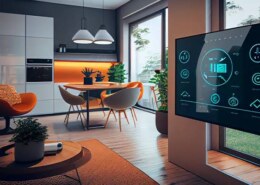The Future of Smart Homes: Predicting Your Needs Before You Do
The smart home of today already feels like science fiction—with lights you can control by voice and thermostats that learn your preferred temperatures. But the future of smart living is set to go much further: your home will soon predict your needs before you even realize them.
This isn’t just about convenience—it’s about creating environments that are intuitive, adaptive, and deeply personal.
From Reactive to Predictive: A Paradigm Shift
Most current smart home systems are reactive—they follow commands like “Turn on the lights” or “Play music.” But emerging technologies are shifting us toward predictive systems that learn your behavior, anticipate your preferences, and act proactively.
Through a combination of AI, machine learning, biometric sensors, and IoT integration, future homes will quietly work in the background, optimizing your environment based on data, context, and emotion.
1. Personalized Daily Routines, Automatically
Your home will start to understand your routines in granular detail. For example:
-
Wake-up time? The blinds gently open, a soft light mimics sunrise, and your coffee brews—only if it’s a weekday.
-
Forgot to lock the door? The system detects your departure and locks it automatically.
-
Back from the gym? It sets the shower temperature and plays your recovery playlist.
The more you interact with your smart environment, the more it learns. Over time, it doesn’t just follow your lead—it walks a few steps ahead.
2. Emotional Intelligence in Your Living Space
The future smart home won’t just sense what you’re doing—it will understand how you’re feeling.
-
Feeling anxious? Soft lighting, calming scents, and relaxing sounds can activate automatically.
-
Had a poor night’s sleep (as tracked by your wearable)? The home might delay your morning routine, lower the brightness, and suggest a protein-rich breakfast.
Through emotion recognition via voice, facial expressions, or physiological data, your home becomes a responsive ally for mental and physical well-being.
3. Smarter Energy and Resource Management
Predictive smart homes will also contribute to a greener future:
-
Energy consumption will adjust in real time based on occupancy, weather, and utility rates.
-
Appliances will schedule their operation during off-peak hours without needing your input.
-
Systems will notify you of unusual usage patterns—like a water leak or an appliance that’s underperforming—before they become major issues.
This not only reduces your carbon footprint but can also lead to substantial cost savings.
4. Preparing for What’s Next—Before You Ask
Truly smart homes will start thinking ahead:
-
Calendar shows a morning meeting? The house preps your workspace with optimal lighting, noise suppression, and screen mirroring.
-
Rain in the forecast? Your windows close automatically, and the robot vacuum skips the foyer.
-
Hosting guests? The home sets the perfect ambiance—lights, music, scent, temperature—based on past preferences or guest profiles.
5. Centralized Intelligence: The Home’s “Digital Brain”
Rather than controlling multiple apps and devices, the future smart home will be managed by a central AI assistant—a digital “home brain” that orchestrates everything from energy use and security to entertainment and health monitoring.
This brain will unify all your devices under a single interface, learning holistically rather than in isolated silos.
6. Security and Privacy: The Silent Gatekeepers
With all this data and intelligence comes a natural concern: How secure is it?
Expect future homes to:
-
Use on-device processing for sensitive data to reduce cloud dependency.
-
Offer clear consent controls, so you can decide what’s shared and with whom.
-
Incorporate AI-based threat detection to safeguard against both digital and physical intrusions.
Privacy won’t be an afterthought—it will be built into the architecture.
What This Means for You
The goal of the predictive smart home isn’t just to automate—it’s to liberate. To give you back time, reduce mental clutter, and create an environment that works with you, not just for you.
In the near future, your home might:
-
Remind you to hydrate before a workout.
-
Suggest recipes based on what’s in your fridge—and your nutritional goals.
-
Recognize when you’re overwhelmed and suggest a break with ambient lighting and a favorite playlist.
Conclusion: Welcome to the Age of Anticipation
We are moving beyond homes that are merely smart. The next evolution is homes that are intuitive, empathetic, and proactive—homes that predict your needs, care for your well-being, and enhance your life in ways that feel almost invisible.
The smart home of the future won’t just respond. It will understand.

